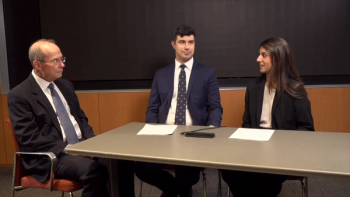
Tips for better contract negotiations for young ophthalmologists
Lisa Nijm, MD, advises young ophthalmologists on how to find common ground with their preferred practice and find solutions in the negotiation process that will help both parties flourish.
Lisa Nijm, MD, founder and medical director of Warrenville Eye Care & LASIK and assistant clinical professor of ophthalmology at the University of Illinois Eye & Ear Infirmary, shares her top tips for young ophthalmologists entering the field.
As the creator and program director of Real World Ophthalmology—a conference that speaks directly to clinicians within the first 10 years of their practice—Dr. Nijm lends her expertise about contract negotiations to help ease nerves and empower job seekers to achieve solutions between themselves and their future practice.
Video transcript
Dr. Lisa Nijm: Hi, this is Dr. Lisa Nijm, I'm the founder and medical director of Warrenville Eye Care & LASIK and an assistant clinical professor of ophthalmology at the University of Illinois Eye and Ear Infirmary. I'm also the creator and program director of Real World Ophthalmology.
The talk I gave was surrounding contract negotiations for young ophthalmologists, Getting to Yes. And I gave a mini workshop, and I'm going to give you the five highlights here of things that you can do to come to more successful contract negotiation.
So the first is to overcome your fears. When people mention negotiating your first contract, the first feelings that people get are those of anxiety and nervousness. You know, when somebody asks what you want to do on the weekend, the first thing that you say is not, “I want to go negotiate a contract.”
But really, what we need to do is get over our fears with that and realize that we have all the tools that we need to come up with a successful contract negotiation; we just have to be willing to put in the time to prepare and come with a plan of action to achieve our goals in contract negotiation.
So the second thing is to get the facts. You do want to prepare, and you want to understand what it is that the practice is looking for. What are the typical salaries in that area? What is it that you're looking for in a practice? And have the facts ready. Understand what the volume is of the practice, what the financials are of the practice. You have to do all that preparation ahead of time, so that you can move on to step three.
Which brings us to step three, which is building your case. So once you've identified the facts, you start preparing to know what you want. You have to build a case around your top two or three things that you want to negotiate—your top priorities. There are probably going to be about six to seven points that you can negotiate in the contract, but you want to have a large number, and then focus on the top two or three that are really your top priorities. And sort of develop what you're bringing to the practice and how you can help that practice grow, to use as collateral to help negotiate your positions on those top two to three most important issues.
And the last thing is coming to the table, being willing to work towards solutions. You're going to find areas of commonality between you and the practice and you're negotiating with and then you want to work towards solutions, especially if you feel like this is a job that you want to be at. You want to find common ground that you can work towards solutions, not necessarily compromises—although there will be compromised and give or take—but solutions that work for both you and the practice to have a good working relationship moving forward. I hope these tips were helpful to you. Thank you.
Note: This transcript has been lightly edited for clarity.
Newsletter
Don’t miss out—get Ophthalmology Times updates on the latest clinical advancements and expert interviews, straight to your inbox.





























